如何提高英语听力能力论文
如何提高听力英语三级作文

如何提高听力英语三级作文英文回答:As a language learner, improving listening comprehension is a crucial aspect of enhancing my overall proficiency. To elevate my English listening skills to the third level, I have devised a comprehensive plan that incorporates immersive techniques, active engagement, and strategic practice.Firstly, I prioritize immersing myself in rich and authentic English environments. I dedicate regular time to watching English-language movies, TV shows, and documentaries. These sources offer a wide range of accents, speech patterns, and vocabulary, exposing me to the nuances of spoken English. Additionally, I listen to English podcasts and audiobooks to expand my exposure to different topics and improve my understanding of conversational speech.Active engagement is another pillar of my listening improvement strategy. While listening to English content, I take notes of unfamiliar words, phrases, and cultural references. I pause and replay sections to grasp the meaning and context better. By actively engaging with the material, I retain information more effectively and develop a deeper understanding of the language.Strategic practice is essential to reinforcing my listening skills. I utilize online listening exercises and apps to practice specific listening skills, such as identifying key details, summarizing main ideas, and inferring meanings. I also engage in regular conversations with native English speakers or language exchange partners, allowing me to apply my listening comprehension skills in real-life situations.By embracing these techniques, I am confident in my ability to significantly enhance my listening comprehension skills. With persistence and dedication, I am eager to progress to the third level of English listeningproficiency and continue my journey towards linguistic mastery.中文回答:作为一名语言学习者,提高听力能力对于提升英语水平至关重要。
如何提高英语听力和口语能力英语作文初三
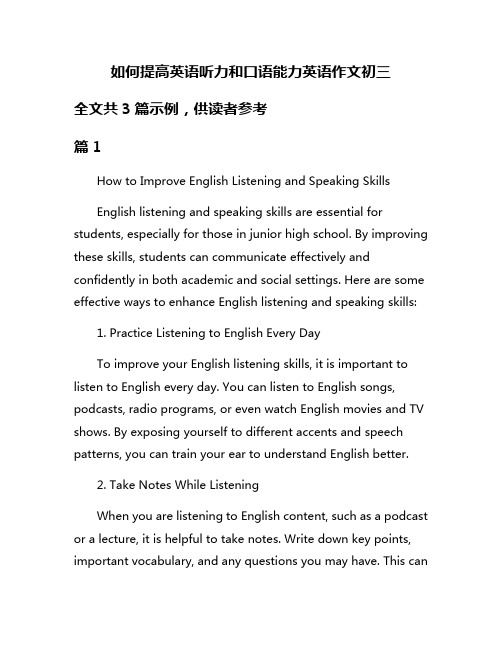
如何提高英语听力和口语能力英语作文初三全文共3篇示例,供读者参考篇1How to Improve English Listening and Speaking SkillsEnglish listening and speaking skills are essential for students, especially for those in junior high school. By improving these skills, students can communicate effectively and confidently in both academic and social settings. Here are some effective ways to enhance English listening and speaking skills:1. Practice Listening to English Every DayTo improve your English listening skills, it is important to listen to English every day. You can listen to English songs, podcasts, radio programs, or even watch English movies and TV shows. By exposing yourself to different accents and speech patterns, you can train your ear to understand English better.2. Take Notes While ListeningWhen you are listening to English content, such as a podcast or a lecture, it is helpful to take notes. Write down key points, important vocabulary, and any questions you may have. This canhelp you to better understand and remember the information you are listening to.3. Practice Speaking English DailyTo improve your English speaking skills, it is essential to practice speaking English every day. You can practice speaking with friends, family members, or even in front of a mirror. By speaking regularly, you can become more confident and fluent in English.4. Join English-Speaking Clubs or ClassesJoining English-speaking clubs or classes can also help you improve your English listening and speaking skills. By interacting with others who are also learning English, you can practice speaking in a supportive environment and receive feedback from others.5. Read AloudReading aloud is a great way to improve your English pronunciation and fluency. Choose a passage from a book, article, or website, and read it out loud. Pay attention to your pronunciation, intonation, and stress patterns as you read.6. Use Language Learning Apps and WebsitesThere are many language learning apps and websites that can help you improve your English listening and speaking skills. These resources often offer interactive exercises, quizzes, and games to practice listening and speaking in English. Some popular language learning apps include Duolingo, Rosetta Stone, and Babbel.7. Record Yourself SpeakingRecording yourself speaking in English can be a useful way to track your progress and identify areas for improvement. Listen to your recordings to analyze your pronunciation, intonation, and fluency. You can also compare your recordings to native speakers to see how you can sound more natural.8. Seek Feedback from Teachers or TutorsFinally, seeking feedback from teachers or tutors can also help you improve your English listening and speaking skills. They can provide personalized guidance and suggestions on how to improve your pronunciation, vocabulary, and grammar.In conclusion, improving English listening and speaking skills takes time and effort, but by practicing regularly and using a variety of resources, you can make significant progress. By following these tips, students in junior high school can enhancetheir English communication skills and become more confident English speakers.篇2How to Improve English Listening and Speaking SkillsAs an English learner, improving listening and speaking skills is crucial for improving overall proficiency in the language. Here are some tips on how to enhance your English listening and speaking abilities:1. Listen to English as much as possible: The best way to improve your listening skills is to surround yourself with English audio. This could be through watching movies, listening to music, or following podcasts in English. The more exposure you have to the language, the more your listening skills will improve.2. Practice active listening: When listening to English content, try to actively engage with the material. This means focusing on the conversation or dialogue, taking note of unfamiliar words or phrases, and trying to understand the main idea of what is being said. You can also pause and rewind the audio to listen to certain parts again if needed.3. Practice speaking regularly: To improve your speaking skills, it is essential to practice speaking English on a regular basis.This can be done through conversations with native speakers, joining a language exchange program, or even talking to yourself in English. The more you speak, the more comfortable you will become with using the language.4. Work on pronunciation: Pronunciation plays a key role in effective communication. Practice pronouncing words correctly, pay attention to intonation and stress patterns, and work on reducing your accent to sound more natural in English.5. Expand your vocabulary: Having a wide range of vocabulary will not only improve your speaking skills but also your listening comprehension. Try to learn new words and phrases daily, and use them in conversations to reinforce your memory.6. Seek feedback: Ask for feedback from teachers, friends, or language partners on your speaking and listening skills. Constructive criticism can help you identify areas for improvement and make necessary adjustments.7. Engage in language immersion: Immerse yourself in English-speaking environments as much as possible. This can include participating in language immersion programs, attending language workshops, or traveling to English-speaking countries.8. Use technology to your advantage: There are numerous apps and online resources available to help improve your English listening and speaking skills. Utilize language learning apps, online courses, and language exchange platforms to practice and enhance your language abilities.9. Be patient and persistent: Improving your English listening and speaking skills will take time and effort. Be patient with yourself, practice consistently, and don't be afraid to make mistakes. Remember that language learning is a gradual process, and with dedication, you will see improvement over time.In conclusion, improving English listening and speaking skills requires dedication, practice, and perseverance. By incorporating these tips into your language learning routine, you can enhance your proficiency in English and become a more confident and effective communicator. Keep practicing, stay motivated, and don't be afraid to challenge yourself to reach your language learning goals.篇3How to Improve English Listening and Speaking SkillsIn today's globalized world, English has become a crucial language for communication in various fields. Therefore, it isessential for students, especially those in junior high school, to improve their listening and speaking skills in English. Here are some effective strategies to enhance English listening and speaking abilities:1. Watch English movies and TV shows: Watching English movies and TV shows can expose students to different accents, colloquial expressions, and vocabulary. This can help improve listening skills and expand their knowledge of the English language.2. Listen to English music and podcasts: Listening to English music and podcasts can help students improve their listening skills while enjoying the rhythm and melody of the language. This can also help students pick up new phrases and expressions.3. Engage in English conversations: Practicing speaking English with friends, teachers, or language exchange partners can significantly improve speaking skills. Students can also participate in English-speaking clubs or activities to practice speaking in a more structured environment.4. Read English books and articles aloud: Reading English books and articles aloud can help students improve their pronunciation, intonation, and fluency. It can also help students become more confident in speaking English.5. Use language learning apps: There are many language learning apps available that can help students improve their listening and speaking skills. These apps provide interactive lessons, listening exercises, and speaking practice opportunities.6. Participate in language exchange programs: Joining language exchange programs can provide students with opportunities to practice speaking English with native speakers. This can help students improve their conversation skills and become more comfortable speaking in English.7. Take English classes or tutoring: Enrolling in English classes or seeking tutoring from a qualified English teacher can provide students with personalized guidance and feedback on their listening and speaking skills. This can help students improve more quickly and effectively.Overall, improving English listening and speaking skills requires consistent practice, exposure to the language, and a willingness to step out of one's comfort zone. By following these strategies and actively engaging in language learning activities, students can enhance their English communication skills and become more confident speakers.。
提高英语听力英语作文
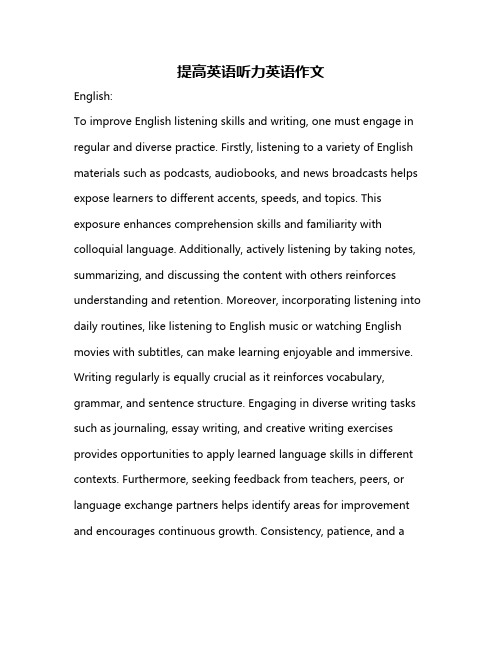
提高英语听力英语作文English:To improve English listening skills and writing, one must engage in regular and diverse practice. Firstly, listening to a variety of English materials such as podcasts, audiobooks, and news broadcasts helps expose learners to different accents, speeds, and topics. This exposure enhances comprehension skills and familiarity with colloquial language. Additionally, actively listening by taking notes, summarizing, and discussing the content with others reinforces understanding and retention. Moreover, incorporating listening into daily routines, like listening to English music or watching English movies with subtitles, can make learning enjoyable and immersive. Writing regularly is equally crucial as it reinforces vocabulary, grammar, and sentence structure. Engaging in diverse writing tasks such as journaling, essay writing, and creative writing exercises provides opportunities to apply learned language skills in different contexts. Furthermore, seeking feedback from teachers, peers, or language exchange partners helps identify areas for improvement and encourages continuous growth. Consistency, patience, and apositive attitude are key to mastering both listening and writing skills in English.中文翻译:要提高英语听力和写作能力,一个人必须进行定期而多样化的练习。
如何提高学生英语听说能力论文

如何提高学生英语听说能力摘要:介绍培养学生英语听说能力的方法,选择适合学生的听说方法,充分调动学生的积极性,逐步提高学生英语听说能力。
关键词:提高英语听说能力英语作为一门语言学科听说能力十分重要。
而在英语学习过程中,大多数学生为了应付考试,只注重笔试而忽视了听力和口语能力无法达到交际目的,为了改变这种现状,老师在英语教学中就要设计好英语听说课,培养学生英语听说能力,在此谈一谈我在上听说课时所采用的一些方法。
一、听说是一个检验词汇记忆的过程听、说、读、写、译这五个部分在英语学习中缺一不可,而词汇是其共同的基础,所以在英语教学中怎样帮助学生记住单词是非常重要的,我们可以在教学中采用以下方法。
1. 用物感知,巩固记忆。
人对自己感兴趣的东西就比较注意,而注意力集中于其上的事物,给人留下的印象就比较深刻。
一些专家调查统计的结果表明:人们学习那些自己感兴趣、对自己有吸引力的东西,其记忆效果几乎可增加一倍半。
根据这一心理规律,老师在讲解词汇时,要选那些有趣的例句,还要根据学生年龄的特点,尽量联系学生感兴趣的事物,这样就会提高记忆单词的效率。
2.激发动机,促使记忆。
强烈的动机是指做某件事情时有明确的目的性。
动机的强弱和记忆里的好坏是紧密相关的。
有了这种强烈的动机,人就可以充分提高记忆的效率,发挥出自己的聪明才智。
教师可以在课堂上开展一些小型的比赛活动,比如在交单词前,就像学生宣布:今天学的单词,课后要进行检查,要比一比、赛一赛,看谁学得好,对于记得快、记得好的同学,要给予奖励。
有了这一目标,那些有上进心和自尊心的同学在听老师讲解时,就会把注意力集中在记单词上。
组织阶段性记单词比赛的方法,可以激励学生努力记单词。
3.观察揣摩,科学记忆。
教师不管采取什么方法入手教单词,最终都要在黑板上出示词形。
心理实验证明:人通过眼睛所获得的信息约占百分之八十九至九十,而通过耳朵获得的只有百分之十左右;耳听三小时后记住百分之六十,三天后记住百分之十五;眼睛看三小时后记住百分之七十,三天后还能记住百分之四十。
如何提高英语听力能力论文

如何提高英语听力能力【摘要】本人根据多年教学经验认为要想提高英语听力能力必须持之以恒,广泛阅读,熟悉语境,加强听力、听速训练,同时在提升听力能力的各个阶段应做好相应工作,只有日积月累才能取得良好效果。
【关键词】英语听力朗读语境训练人类的有声语言无论是东方的还是西方的,全都是耳听口讲的语言,所以学语言时,应当先从耳听人手。
在英语学习中,听事提高说、读、写技能的前提和基础。
可以说听的技能提高了,语言的交际就会成功的进行下去,其他技能也会随之得到提高。
初中新目标英语,进一步提高了对学生听力能力的要求:1、了解所听材料的大意;2、能够抓住材料中的具体细节;3、能够把自己所具备的背景知识与听力材料中所述的内容进行比较,以辨别其正误;4、能够判断说话人的意图和感知说话人对问题的态度。
要使学生达到上述英语听力的要求,掌握一定的听力理解技巧,是非常重要,在训练学生英语听力的教学过程中,应当注意以下方面:一、加强阅读和朗读,注意积累阅读是英语学习中重要的积累过程,有了足够的积累,才能有丰富的词汇及背景知识。
在阅读时,应有目的地选择新颖有趣、语言地道、难度适中、题材广泛、循序渐进,实用性强,有利于培养学生学习英语的兴趣和积极性,扩大英语输入量。
朗读,即出声的阅读,这样有利于训练学生的语音、语调和语感,也同时促进听力的提高,优秀的英语学习者通常都有朗读的习惯,对学生而言,课本就是最好的材料,一些短小精练的英文简写本也是朗读的好材料,朗读和阅读一样,贵在持之以恒。
二、语境及听速训练目前中国学生没有合适的英语语境,在语言反映速度上欠缺,导致对所听语言的理解造成障碍。
所以教师要努力营造英语听说、听写环境,在进行听力训练时常给予学生正常语速的语境训练,不一定要求学生完全听懂所给的语言材料,只要求学生跟上语言速度,理解语言环境。
另外教师应多鼓励学生收听收看英文广播,外国电影、电视等,这对于英语听力能力的提高有很大帮助。
三、课堂听力教学训练以本为本,充分挖掘课本资源。
写信给好友教他如何提升英语听力英语作文
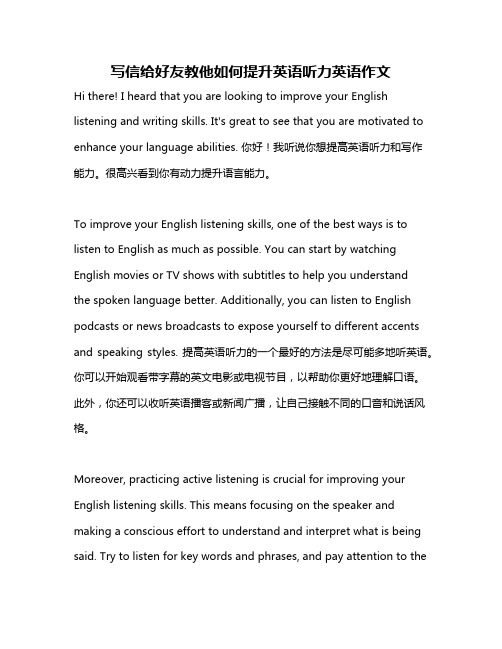
写信给好友教他如何提升英语听力英语作文Hi there! I heard that you are looking to improve your English listening and writing skills. It's great to see that you are motivated to enhance your language abilities. 你好!我听说你想提高英语听力和写作能力。
很高兴看到你有动力提升语言能力。
To improve your English listening skills, one of the best ways is to listen to English as much as possible. You can start by watching English movies or TV shows with subtitles to help you understandthe spoken language better. Additionally, you can listen to English podcasts or news broadcasts to expose yourself to different accents and speaking styles. 提高英语听力的一个最好的方法是尽可能多地听英语。
你可以开始观看带字幕的英文电影或电视节目,以帮助你更好地理解口语。
此外,你还可以收听英语播客或新闻广播,让自己接触不同的口音和说话风格。
Moreover, practicing active listening is crucial for improving your English listening skills. This means focusing on the speaker and making a conscious effort to understand and interpret what is being said. Try to listen for key words and phrases, and pay attention to thespeaker's tone and emphasis to grasp the meaning behind the words. 此外,进行主动倾听练习对提高英语听力至关重要。
如何提高初中生英语听力水平论文

浅谈如何提高初中生英语听力水平在中考英语考试之前有单独一个英语听力的加试,在备考时,常有这样的现象:平时英语成绩很好的学生,对听力加试总是心里没底,得分也是不尽如人意。
那么该如何提高初中生英语的听力水平呢?我谈谈自己的看法。
一、注意学生语音、语调能力的提高学生都有这样的感觉:自己、老师、同学说的英语能听懂,而磁带中说的英语就听不明白了。
这就说明了语音、语调在听力中的重要性。
同时也对我们英语教师的发音提出了要求。
我们在学习中应重视纯正的英、美英语的发音、重读、连读、语调、节奏等内容。
跟英语课本附带的磁带读是比较好的方法,磁带中包括单词、句子和整篇课文的朗读,鼓励学生多听多模仿,用最“英语”的语音、语调来说英语,有助于学生英语听力的提高。
二、注意抓学生的词汇很多学生听不懂英语段子,词汇量不够是一个主要原因。
一句话中有一两个单词不知道什么意思,就会影响对整句甚至整段的理解。
学生对词汇熟练掌握之后,在听到某个单词、短语、习惯用语和固定搭配等时,在大脑中马上就可反映出其意思,缩短了英语转化为汉语意思的时间,最后发展成用英语思维来学习,英语听力水平将大幅提高。
三、创造课堂英语语言环境大多数学生的听、说英语环境,基本上就是在课堂上,所以教师要充分利用好课上时间。
课前用三五分钟安排个听力小测验,教师尽量用英语来组织学生,讲解课文等。
学生也要尽量用英语来提出问题,解决问题。
教师也可在课堂上适当地安排泛听和精听内容。
泛听可放在早自习时,不需要学生仔细听懂每一句话,只需听,来培养他们的语感。
当然,这方面的训练也可留给学生家长,通过放英语课本磁带给孩子,创造出一个英语的语言环境。
精听可单独安排出时间,内容的选择,应由易到难,先单词、短语,后句子、段落。
要求学生限时完成。
学生应全神贯注,努力听好每个内容,同时要配合着写,听后写也是对听的促进。
总之,在英语语言环境中听、说英语,对学生英语的提高既快又好。
四、注重听力答题技巧的培养在每次的听力训练时,强调学生应注意:听前,通览一下题目,猜一下每题谈论的话题,作者的意图。
如何提高初中生英语听力论文

如何提高初中生英语听力摘要:提高中学生的英语听力水平是至关重要的,它直接关系到学生说、读、写三种能力的提高。
英语教师应在摸清并排除造成听力困难因素的基础上,扎扎实实地利用初中三年的课内外时间,采用一些有效的办法来提高学生的英语听力。
关键词:积极性有机结合有效学习英语作为一种交际工具,在现代国际社会中起着举足轻重的作用。
人们学习英语很重要的一个目的就是为了能够用英语自如地表达自己的思想,达到交际的目的。
而这是建立在听的基础上。
听力教学在整个英语教学特别是基础阶段的初中英语教学中,占有一席之地。
我们只有听、说、读、写并重,在加强英语教学的同时加强英语听力教学。
初中英语听力教学是提高学生听力水平的重要阶段,教师应给予高度的重视,在这一阶段,我们应该做到的是激发学生听说的积极性,掌握扎实的听力基本功,听力技巧和方法,树立学生的自信心,让学生主动听,乐于听,并在听懂的前提下,逐渐掌握英语交际功能。
没有听,就不可能有说。
提高中学生听的能力,是中学英语学习中必不可少的一个环节。
如何有效提高学生的英语听力,是每位英语教学工作者不断探讨的难题。
本人根据自己多年学习英语的实践及两年的英语教学经验,从各方面分析造成学生听力不好的因素,提出提高英语听力水平的方法。
一、将听力训练渗透于每堂英语课的教学中当学生第一次走进英语课堂时,我们就要对其进行英语听力教学,坚持录音机每天都进入课堂。
新教材,着重培养学生通过听来辨析词义,语义的能力,以及对简短对话和短文的全面理解和捕捉重要信息的能力。
提高学生的听力不是一时半会儿就能做到的。
在日常教学中,首先教师要用英语组织教学,加上必要的手势、表情、简笔画等,学生的注意力会更加集中。
其次要坚持训练,应从多听教学听力录音带入手。
最后,加强基础语言知识综合技能的训练的同时应做到听说读写四种技能进行综合训练,并做到听说结合,听读结合,听写结合。
1.听说有机结合。
在更多的实际情况中,听说的活动是互相结合同时发生,并且听说之间相辅相成。
小学英语精美论文-浅谈如何提高学生听力水平_通用版

浅谈如何提高小学生听力水平【文章提要】:小学英语教学中要求听说领先,读写跟上,所以学语言首要是能“听”会“说”。
听力水平的提高为发展学生其他各项能力起到促进作用。
但在英语的听说读写四项技能中,大多数学生感到最难掌握的就是听力。
实践证明:听力是英语教学的重点,也是需要我们教师花大力气的难点。
学生往往存在着不同程度的听不懂、怕开口,羞于开口的现象,所以,我认为在教学过程中采取多种有效方法,激发学生兴趣,让学生乐听、会说、爱说、是极其重要的。
【关键词】:小学英语教学听力训练提高听力水平不仅有利于说、读、写这三项技能的发展,而且为开展日常交际打下坚实的基础。
但对学生而言,听力往往又是难度最大的。
传统的教学长期重视读写训练,而忽视听说的培养,学生的文化基础、心理状态也影响了他们听力的发展,语言环境的缺失也使得学生听力能力相对薄弱。
如何改变这一现状?几年的英语教学,我有如下感触:提高听力水平我觉得首先要让学生对听力练习有兴趣,克服恐惧心理,注意学生良好心理素质的培养。
美国心理学罗杰斯说:“成功的教学依赖于真诚、理解和信任的师生关系,一种充满心理安全感的课堂气氛。
”一个人听力理解能力的好坏与心理素质有密切关系。
学生在生活中时刻处于汉语的语言环境中,不适应英语的语言环境,在进行听力训练时,学生要听清、听懂稍纵即逝的语言材料,明确语言的含义,与此同时作出正确的判断回答问题,这对他们来说很不容易,一旦出现不会回答的题目,学生会产生较重的心理负担,变得手忙脚乱,结果往往连最简单的词句都听不懂。
因此在平时的听力训练中,教师要注意学生的心理变化,创造轻松的课堂气氛,避免使其产生厌恶甚至抵触情绪。
我在教学中利用直观教具,多媒体手段等进行教学,设计合理的动作及表演活动调动学生多个感官来学习而不是进行机械的操练,调动学生学习的积极性,给他们听的动机、自信心和放松状态,潜移默化地练习了听力。
提高听力水平必须帮助学生掌握适当的语音知识,进行听力技巧训练。
高中生如何有效提高听力能力策略论文

高中生如何有效提高听力能力策略探究【摘要】听是人们言语交际能力的重要方面,也是英语学习中听、说、读、写四项基本技能之一。
英语听力教学近年来一直是外语教学的重要环节,如何提高听力能力始终为人们所关注,因此教师应该开展更多适合学生的听力训练来提高学生的听力能力。
本文重点探讨了学生在听力学习方面存在的问题,以及提高学生听力的一些策略,从而提高学生英语听力水平。
【关键词】听力听力能力提高在英语学习中,听、说、读、写四项基本技能的培养是缺一不可的。
而听又是排在第一位,起到先锋的作用。
英语新课标中也指出,英语教学的目的是培养学生形成初步运用英语进行交际的能力。
而且在各种英语考试中首先进行的是听力部分的考试,继而是笔试部分的考试。
这体现了听力在高中英语学习中的重要地位,如何提高学生的英语听力水平,是广大师生关注的问题。
但是经过这几年的教学实践,我发现学生,尤其是我们农村的学生普遍存在着听力理解能力比较弱的情况。
这不仅影响了学生英语水平的提高,而且也大大降低了学生学习英语的积极性和自信心。
因此作为一名高中英语教师,首要任务就是要通过各种策略来提高学生的听力能力。
一、提高学生的语音辨别能力学生若不能正确地辨音,就会听不清考场上英语录音中的话语,理解力也会大打折扣,更不用说收看广播电视上的节目了。
所以,要想在听力上有所提高,学生首先要排除语音识别方面的障碍。
首先教师要要求学生花大量时间掌握正确的英语发音以及句中的意群、停顿、连读、不完全爆破、弱读、语调等等。
教师要鼓励学生多听原版书籍和电影资料,有条件的学生可以定时收看cctv9的英语节目。
其次教师在课堂上应多让学生听教学听力录音磁带,如所学的课本录音带、口语教材录音带、听力专项训练录音带等。
同时,学生在练习时应有意识地聆听录音材料中的语音现象,注意同化、重读、弱读、连续、失去爆破等现象,还要注意句子的重音、语调、语气、语速等。
最后,教师应利用好课堂帮助学生掌握好单词发音,多音节词的重读音节,英美语在发音上的区别。
英语教学论文-对提高小学生英语听力水平的研究的论文

对提高小学生英语听力水平的研究的论文听是人们语言交际能力的重要方面,也是英语学习的重要途径之一。
krashen曾说:“无论儿童或成年人,在语言习得中,头等重要的是听力理解。
”通过听觉领悟语言是一个复杂的过程,它包括接受信息、识别、判断和理解声音信号等几个层次的心理活动。
小学阶段,学生必须尽快提高自己的英语听力水平,只有听得正确,才能读得流畅,说得流利。
1影响小学生听力发展的因素11听力缺少语言环境。
现在的小学英语教学,每周课时较少,课堂是英语教学的主阵地。
同时受语言环境的限制,小学生在课外很少有接触英语的机会,与家长、同伴的交流主要靠母语。
如果要感受英语的纯正语音与语调,那只有磁带才是最好的老师了。
那又有多少学生会自觉主动地去拿磁带来听呢?我曾作过一个不完全统计,我所任教的三年级两个班学生经常在家里听磁带录音的人数不到总人数的三分之一。
12英语课堂忽视听力。
在小学英语课堂教学中,一般都设有让学生听课文录音并跟读模仿这一环节,但这环节恰恰是培养听说能力最重要、最有效的方法,完善这一部分的教学,对于培养学生正确的语音、语调、语感,培养学生正确的模仿能力和表达能力都起着非常重要的作用。
可是,就我所知,在大部分的英语课堂教学中,这一环节名存实亡。
2发展小学生英语听力的途径与方法21努力创设英语听力的语言环境。
在课外作业的布置中除了笔头的操练外,我们更要把听力和口头训练放在首位。
我每教完一课内容,便要求学生回家跟读录音10遍,这里强调“跟读”,是先听原版录音再读,这与学生以自己的方式朗读是不同的。
m谁来督促学生的实际行动呢?那只有靠家长的帮助了,请家长配合完成此项任务,并以签名作为凭证。
22重视课堂教学中听力环节的运用。
在小学英语课堂教学中听力环节有很多。
听录音跟读是听,听指令做动作、听问题作回答、听对话作判断也是听,而且是有意义、有目的的听,更容易激发学生听的动机和意愿。
心理学研究表明,词汇量的增加,不是靠孤立、机械的记忆单词,而是通过各种语言场景去接触它,运用它。
关于提升英语听说的作文
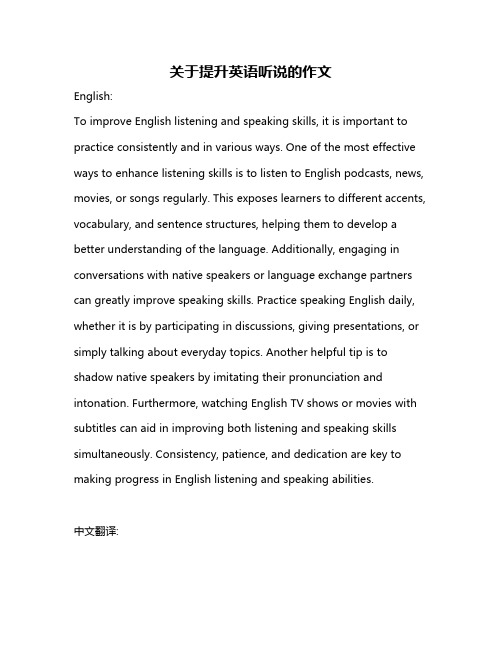
关于提升英语听说的作文English:To improve English listening and speaking skills, it is important to practice consistently and in various ways. One of the most effective ways to enhance listening skills is to listen to English podcasts, news, movies, or songs regularly. This exposes learners to different accents, vocabulary, and sentence structures, helping them to develop a better understanding of the language. Additionally, engaging in conversations with native speakers or language exchange partners can greatly improve speaking skills. Practice speaking English daily, whether it is by participating in discussions, giving presentations, or simply talking about everyday topics. Another helpful tip is to shadow native speakers by imitating their pronunciation and intonation. Furthermore, watching English TV shows or movies with subtitles can aid in improving both listening and speaking skills simultaneously. Consistency, patience, and dedication are key to making progress in English listening and speaking abilities.中文翻译:要提升英语听说能力,持续而多样化的练习至关重要。
浅谈英语听力提高的方法的论文

浅谈英语听力提高的方法的论文英语听力是学生从事语言交际的一项基本能力,在听、说、读、写、译各项能力中,“听”始终排在第一位,没有听,就不可能有说,而听的能力是各项能力中最难掌握的,它需要听者对信息在瞬间反应,并作出判断。
长期以来,听力一直是学生学习英语的薄弱环节,在各类英语考试中,听力理解是学生最没有把握的项目之一。
因此,提高英语听的能力是学好英语必不可少的环节。
笔者根据多年的英语听力教学经验,认为在听力教学与应试中,教师必须重视学生听力技能的培养以及实施正确的教学方法,二者有机的结合才是提高英语听力的根本保证。
寻求提高英语听力,行之有效的对策理所当然的摆在英语工作者面前。
笔者在实践中体会到下列一些措施对提高英语听力会有帮助。
1通过大量阅读,朗诵和背诵,注重积累英语听力题材多样,内容广泛,这就要求我们平时对知识进行积累,知识积累的最佳方法是大量的阅读和朗诵,因为阅读是外语学习中重要的输入过程,也是积累过程,有了足够的积累,才能有丰富的词汇及背景知识。
在阅读时,应该有目的的选择难易适中的相关读物,这样有选择性的阅读既能提高英语的分析能力,又能训练自己的思维。
同时尽量做到分类阅读,使题材和体裁多样化,避免单一的阅读;同时要加强朗读,即出声的阅读,听读。
听说不分家,优秀的英语学习者通常有朗读的习惯,对学生而言,课本就是最好的材料,一些演讲名篇和短小精悍的英文也是朗读的好教材。
朗读和阅读一样,贵在坚持,不可间断。
其次我们还要对一些重要句型和情景对话进行背诵,这样便会逐步解决语音辨别能力低,语流连贯能力弱,不同口音辨析能力差等问题。
2利用现代化手段,了解中西文化的差异英语对话谈论的话题十分广泛,如问路、购物、旅游、约会等,涉及到英美日常生活的方方面面。
由于文化背景不同,英美人的衣食住行与我们有很大的差异,这就需要学生了解英美文化背景知识,反过来,通过听英语对话,我们又可以从各个侧面了解英美人的风俗习惯,充实语言文化背景,拓宽知识面。
如何提高英语听力能力论文

如何提高英语听力能力论文摘要:现阶段学生对英语的学习,往往是以书面英语能力为主,长期以来,我国英语学习对于听力的练习不够重视,传统的英语教学模式,不利于学生听说读写综合能力的培养,对听说能力的培养也缺乏足够的认识。
关键词:提高英语听力练习0 引言听力在英语学者的综合能力考查中,所占的比重越来越大,但是从总体上来看,现阶段学生对英语的学习,往往是以书面英语能力为主,长期以来,我国英语学习对于听力的练习不够重视,传统的英语教学模式,不利于学生听说读写综合能力的培养,对听说能力的培养也缺乏足够的认识。
1 科学设置英语语言学习的良好环境英语的学习,最主要的目的在于实际应用,语言本身就是人们沟通交流的工具,在我国大部分英语的学习,对英语听说能力的培养不够重视。
受学习环境的影响,学生在掌握了一定的英语听说能力之后,长期不运用,或者没有合适的环境运用,就会逐渐丧失基本的英语听说能力。
基于这种情况,就需要在日常的英语学习中,不断提高对英语听说能力的练习,英语节目、网络资料、磁带、工具书以及一定的阅读材料等都是拓展学生听说读写能力的常用工具,学生通过阅读英语材料、听英语新闻、书写英文作文、背诵英文材料等可以提高英语的听说读写综合能力。
2 练习准确发音英语的发音和听力是相辅相成的。
语言的声音不是简单的声音,它是从人的嘴里发出来的一种含有高等智慧的复杂的声音。
要想识别和理解这种声音,一方面要多听这种声音,使自己的耳朵习惯于这种声音,另一方面就要通过自己不断地练习亲自发出这种声音,亲自创造和体验这种声音的每一个细节,来练就对这种声音的熟悉程度和熟悉能力,才能反过来学会识别这种声音。
声音的熟悉,对于英语听力的提高,有着十分重要的影响作用,因此要想彻底听懂语言,不亲口说出这种语言是不行的。
因此要想提高听力能力,就不能丢下发音训练,要听力、发音一起练习,二者缺一不可。
3 “精听”和“泛听”合理搭配,协调使用学生英语听力能力的提高,需要经过长时间反复的听力练习,在练习听力过程中,“精听”和“泛听”要相互协调,配合使用。
关于提高英语听力和口语的英语作文范文

关于提高英语听力和口语的英语作文范文English:To improve English listening and speaking skills, there are several effective measures one can take. Firstly, it is crucial to immerse oneself in an English-speaking environment as much as possible. Watching English movies, listening to English songs or podcasts, and conversing with native speakers are great ways to expose oneself to the language. Secondly, it is important to practice regularly. Allocating a fixed amount of time each day for listening and speaking exercises can greatly enhance one's abilities. This can include activities such as watching TED Talks or participating in language exchange programs. Additionally, it is beneficial to develop a strong vocabulary. Understanding a wide range of words enables better comprehension while listening, as well as the ability to express oneself fluently. Reading extensively, using vocabulary apps, and learning idiomatic expressions are effective methods for expanding vocabulary. Furthermore, it is essential to pay attention to pronunciation and intonation. By mimicking native speakers, practicing tongue twisters, and recording and analyzing one's own speech, improvements can be made in this area. Lastly, it is beneficialto seek feedback from others. Joining conversation groups, having conversations with teachers or language partners, and participating in language proficiency exams can provide valuable input for improvement. In conclusion, consistent practice, exposure to the language, vocabulary building, pronunciation and intonation practice, and seeking feedback are all effective strategies to enhance English listening and speaking skills.中文翻译:为了提高英语听力和口语技能,有几个有效的措施可以采取。
如何提高高中生的英语听力论文

如何提高高中生英语听力水平五常一中杨秀丽高中生的英语听力能力是一项很重要的能力,是英语教学的四项基本技能之一。
听力在英语学习中起着非常重要的作用,它是英语学习的基础,是奠基石。
提高中学生听的能力,是中学英语学习中必不可少的一个环节。
它直接关系到学生说、读、写三种能力的提高,也是能否完成中学英语教学任务的关键。
英国的教育家曾经说过“We can’t speak without listening”,这充分说明了听力的重要性。
听力实际上包含两个方面:一个是听,另一个是理解。
听是一个被动的过程,但是去理解所听内容就是一个主动、积极的过程了。
那么,怎样才能提高学生听力水平呢?第一,培养兴趣,树立信心,消除心理障碍。
心理学家告诉我们,当人们的情绪紧张焦虑的状态时,就容易产生恐惧心理,使得原本可以听懂的内容也变得扑朔迷离。
教师在课堂上可创设一个轻松愉快的气氛,努力消除学生因害怕、担忧、反感而产生的心理障碍。
兴趣是学生的动力,教师在平时应向学生介绍一些西方国家的历史、地理、文化、习俗、趣闻等。
一方面,培养了学生的兴趣,另一方面,也可以帮助学生更好的理解听力教材。
另外,在课堂上对于学生取得的点滴成绩,教师要及时地给予表扬,激发学生的听音兴趣,树立信心,使学生克服畏惧和紧张的心理,提高听的质量和效率。
尽量选择一些难易适中,篇幅适当,语速相宜的听力材料,使学生在听的初始阶段能够体会到成功的快乐和喜悦,使每个学生都获得一定的成就感,从而对听力产生兴趣,感到放松,克服畏惧心理。
二.从营造语言环境入手,强化听力意识。
课堂中尽可能多地创设语言环境,给学生创造一种外语氛围显得尤为重要。
努力排除母语的干扰,老师用学过的英语讲解新词、新句型和课文,充分调动学生听的器官的积极性,听力能力能在潜移默化中得到提高。
坚持录音机每天都进入课堂,着重培养学生通过听来辨析词义,语义的能力,以及对简短对话和短文的全面理解和捕捉重要信息的能力。
例如,听到文章的题目可以判定文章的体裁;听到开头几句话可以得知文章的背景和叙述范围。
如何提高你的听力理解和口语能力英语作文

如何提高你的听力理解和口语能力英语作文全文共6篇示例,供读者参考篇1How to Get Better at Understanding and Speaking EnglishHi friends! Today I want to talk about how we can all get better at understanding English when people speak it and at speaking English ourselves. Learning another language can be really hard, but I have some tips that have helped me a lot.The first thing is to listen to lots of English! You can't get better at understanding spoken English without hearing it over and over again. There are so many fun ways to listen to English - watch movies and TV shows, listen to songs, podcasts, audiobooks, or just find English videos on YouTube about things you're interested in. At first, you may not understand everything, but that's okay! The more you listen, the more your ears will get used to how English sounds.When you're listening, don't worry if you don't know every single word. Try to get the main idea instead of focusing on words you missed. You can pause and rewind as much as you need to. It also really helps to watch or listen to the same thingmultiple times - you'll be surprised how much more you pick up each time!Reading along while you listen is a great way to practice too. You can find transcripts or subtitles for lots of videos and audio online. Seeing the words while you hear them can help your brain make connections between how words sound and how they're written.Once you've been listening for a while, you can try some listening exercises made for learning English. These have questions to test if you really understood what you heard. Don't get discouraged if you get some wrong at first - it's great practice and you'll get better over time.Listening to English is super important, but speaking it is the best way to really improve your skills. I know speaking a new language can be scary, but the more you practice, the easier it will become! Even just repeating words and phrases out loud while you listen will help get your mouth used to making those English sounds.You can also practice speaking English with friends or family who are learning too. Make a game of taking turns speaking only in English for a little while each day. My friends and I like topretend we're TV hosts introducing a show or giving the weather report. It's really fun and gets lots of laughs!If you don't have anyone to practice conversing with, don't worry - you can still talk to yourself in English! Narrate what you're doing out loud, like "Now I am brushing my teeth. Next I will put on my shoes and go outside." Or pretend you're giving instructions, like how to make your favorite food. The more you speak the words, the more natural it will become.Another idea is to sing along to English songs or do tongue twisters. Songs are great for pronunciation because the words are nice and clear, plus you can listen to the same song over and over. And tongue twisters, like "she sells seashells by the seashore", are perfect for practicing difficult sound combinations.When you do start talking to others in English, don't be afraid to make mistakes! Mistakes are just proof that you're learning and trying your best. If someone doesn't understand you, just rephrase what you said or say it a little slower. Most people will be patient and encouraging if they see you're working hard.The most important things are to stay positive and have fun with it! Learning a language takes time and lots of practice, butit's so rewarding when you start understanding more and being able to express yourself. Just keep listening and speaking as much as you can. Before you know it, you'll be an English master!Those are my tips for improving your English listening comprehension and speaking abilities. I hope they help you feel more confident practicing this super cool language. The world will be open to so many more adventures once you can understand and communicate in English! Let me know if you have any other questions. Now let's all go watch an English movie and see how much we can understand!篇2Here's an essay on "How to Improve Your Listening and Speaking Skills in English" written in a simple and conversational style for elementary school students, with a length of around 2000 words:Title: Tips to Become a Super Listener and Speaker in English!Hi there, friends! Do you ever feel like you can't understand what your teacher or friends are saying in English? Or maybe you find it hard to express your thoughts and ideas when speakingEnglish? Don't worry, I've got some awesome tips to help you become a super listener and speaker!First things first, let's talk about listening. Listening is like a superpower that allows you to understand what others are saying. When you're a good listener, it's easier to follow conversations, learn new words, and even make new friends!Here are some cool tricks to improve your listening skills:Watch English movies and shows: Watching movies and shows in English is a fun way to train your ears. Don't worry if you don't understand everything at first. Just keep watching, and over time, you'll start recognizing more words and phrases.Listen to English songs: Who doesn't love singing along to their favorite tunes? When you listen to English songs, you're not only having a blast but also improving your listening skills without even realizing it!Use English learning apps and games: There are so many awesome apps and games that can make learning English fun and interactive. Some apps even let you listen to stories or conversations while following along with the text.Practice active listening: Active listening means paying close attention to what someone is saying. When you're in yourEnglish class or talking to a friend, try to focus on the words and sounds they're making. If you don't understand something, don't be afraid to ask them to repeat or explain it.Now, let's move on to speaking. Speaking in English can be scary at first, but with practice, you'll gain confidence and become a chatty superstar!Here are some super tips to improve your speaking skills:Read out loud: Reading books, stories, or even your favorite comics out loud is a great way to practice your pronunciation and get comfortable with the rhythm and flow of the English language.Sing along to English songs: Not only does singing along help with your listening skills, but it also helps you practice speaking and pronouncing words correctly.Practice with friends or family: Find a friend or family member who's also learning English, and practice having conversations with them. You can take turns asking and answering questions, or even role-play different situations.Join an English club or group: Many schools and communities have English clubs or groups where you can meetother students who are learning English. These groups provide a safe and supportive environment to practice your speaking skills.Don't be afraid to make mistakes: Remember, everyone makes mistakes when learning a new language. The more you practice speaking, the more comfortable and confident you'll become.Use gestures and body language: If you're stuck trying to find the right word, don't be afraid to use gestures or body language to help get your message across. It's all part of the learning process!Record yourself: Recording yourself speaking English and then listening back can help you identify areas where you need to improve your pronunciation or fluency.Learning a new language like English takes time and practice, but it's also a lot of fun! By following these tips, you'll be well on your way to becoming a super listener and speaker. Remember, the more you immerse yourself in the language, the quicker you'll improve.So, what are you waiting for? Start listening, speaking, and having a blast with English today! Good luck, my friends!篇3Hey friends! Today I want to talk to you about how to get better at understanding English when people speak it, and how to speak it yourself. Learning another language is super hard, but also really fun and useful!First up, let's talk about listening comprehension. That just means understanding what you hear when someone speaks English. The number one most important tip is: LISTEN, LISTEN, LISTEN! You have to hear lots and lots of English being spoken to train your brain. It's like exercise for your ears and brain!One great way to listen more is to watch movies, TV shows, or videos in English. Kids shows and movies like Dora the Explorer are perfect because they speak more slowly and simply. You can also find lots of great educational videos on YouTube Kids in English. Don't worry if you don't understand everything at first - just keep listening!Another awesome trick is to listen to songs in English. Songs are repetitive so you can pick up words and phrases more easily. My favorite English songs are from the movie Frozen! As you start understanding more, try reading along with the lyrics.Reading out loud is also fantastic practice. Ask your parents to get you some kids books, comics, or magazines in English. As you read out loud, you're training your mouth muscles and earsat the same time. Dr. Seuss books with their silly rhymes and made-up words are really helpful.Okay, now let's move on to speaking skills! Obviously you need to open your mouth and make sounds to practice speaking. But here are some tips to help:First, REPEAT, REPEAT, REPEAT anything you hear over and over. Mimic the intonation and rhythm of English speakers as closely as you can. This will train your mouth to make the right movements.Next, narrate your day out loud in English! As you get ready, have breakfast, play, etc. - describe everything you're doing using English words and sentences. It might feel silly at first, but it's great practice.You can also take it further by having makebelieve conversations in English with your stuffed animals or action figures. Make them ask you questions and respond with full sentences out loud.Another way to motivate yourself is to find a language learning partner, maybe a classmate also studying English. You can practice conversing together, teaching and correcting eachother. Playing games entirely in English is both fun and excellent practice.If you're feeling really brave, try introducing yourself to English speakers you meet and attempting to have a basic conversation. Be prepared for awkward pauses or blank looks, and don't be discouraged! The more you try, the more comfortable you'll become.Building vocabulary is super important too. Label household objects with English words and review them frequently. You can find picture dictionaries for kids online or at bookstores. Make flashcards and quiz yourself or ask parents to test you. Singing songs and watching videos designed for learning vocab words is extremely helpful as well.Remember, the most important things are to fully immerse yourself in English as much as possible through listening and speaking practice, and not to get frustrated. You WILL make mistakes and have awkward moments - that's all part of learning! If you stick with it by listening, repeating, conversing as much as possible, you'll be amazed at how quickly your skills improve.Learning a new language gives you a special superpower! It opens up the ability to connect with so many more people and understand different cultures. Pretty cool, right? So be patient,keep a positive attitude, and most of all keep practicing. Before you know it, you'll be an English speaking superhero! Let me know if you have any other questions.篇4Title: Become a Super English Speaker and Listener!Hi friends! Learning English is super fun but it can also be a little tricky sometimes. Speaking and understanding spoken English are skills that take practice. But don't worry, I'm going to share some great tips that will help make you an amazing English speaker and listener!First up, listen listen listen! The more English you hear, the easier it will be for your brain to get used to it. Listening to English audio like songs, movies, TV shows, podcasts, or audiobooks is a fantastic way to train your ears. At first, you might not understand everything and that's okay. Just keep listening and see if you can pick out words or phrases you recognize. The more you listen, the more you'll start to understand.When you're listening, pay close attention and don't just let the English go in one ear and out the other! Look for context clues like emotions in people's voices or visuals that can help youfigure out what's going on. If you're listening to a story, see if you can follow along with the main events and characters. Don't worry about understanding absolutely everything right away. Just focus on the general meaning.Another great tip is to listen and read along at the same time. Find English books, song lyrics, transcripts, or subtitles and follow the written words as you hear them out loud. Seeing and hearing the language together is an awesome way for your brain to connect the sounds with the words and meanings. Reading along also builds your reading skills!Once you've gotten lots of awesome listening practice, it's time to start speaking! Speaking English can feel scary at first but don't be afraid to make mistakes. Everyone makes mistakes when they're learning a new language - even native speakers make mistakes in their own language sometimes! The more you practice speaking, the more comfortable and confident you'll become.A fun way to practice speaking is to narrate your day or surroundings out loud in English. For example, you could say"I'm eating breakfast now. I'm having toast with jam and a glass of milk. After breakfast, I need to brush my teeth before going toschool." Describing your actions and thoughts in English gets your mouth moving to make those English sounds.You can also practice speaking by reading out loud from English books or passages. Reading aloud builds connections in your brain between the written words and spoken words. When you come across words you don't know how to pronounce, look them up and practice saying them correctly.Another fantastic way to improve your speaking is to have conversations in English with a friend, family member, or teacher. Start simple by greeting each other, asking how they are, talking about your day or favorite activities. The more you converse, the more natural and smooth your spoken English will become. Don't be afraid to ask the person to repeat things or slow down if you don't understand. And if you get stuck on a word, use gestures or find another way to explain what you mean!It can also be really helpful to record yourself speaking English and listen back to the recordings. You'll be able to hear your own mistakes and which areas need more practice. Maybe you mix up certain sounds or have a hard time with word stress or intonation. Listening to yourself helps you figure out your personal challenges so you know what to focus on improving.An amazing tool that combines listening and speaking practice is language learning apps and programs. Many of these have pronunciation exercises, conversations with virtual speakers, comprehension quizzes, and fun games - all designed to super charge your English skills. Some even use speech recognition to track your speaking and give you feedback. How cool is that?No matter which techniques you use, the most important things are to keep practicing regularly and don't get discouraged! Becoming fluent in a new language takes patience and hard work, but it's an incredible skill that will open up so many opportunities in life. Just keep listening, speaking, and enjoying the journey of mastering English.You've got this! Put in regular practice and trust that you're making wonderful progress, even if it doesn't feel like it some days. Before you know it, you'll be an unstoppableEnglish-speaking superhero! Now who's ready to start their training? Let's go!篇5How to Get Better at Listening and Speaking in EnglishHi there! My name is Jamie and I'm going to tell you all about how to get really good at listening and speaking in English.Learning English can be hard, but if you practice the right way, it gets easier and easier over time. I've picked up a bunch of great tips from my English teachers and my own experience that I want to share with you!First up, let's talk about listening comprehension. That just means understanding what you hear in English. The number one best way to improve your listening is to listen to lots of English audio and video stuff! Listen to English songs, watch English TV shows and movies, and check out English YouTube videos. At first, it might be really hard to understand. But stick with it! The more you listen, the more your brain gets used to how English sounds.When you're listening, pay close attention and don't just let the English go in one ear and out the other. Try to pick out words you recognize. Read English subtitles or lyrics to help you understand better. If you hear a word you don't know, write it down and look it up later. Little by little, you'll start to comprehend more and more.My English teacher also recommends listening to the same audio or video multiple times. The first time, just try to get the overall gist of what's being said. The next few times, focus in onthe details you missed before. Pause and rewind as much as you need to. Pretty soon, you'll be able to understand everything!Another awesome tip is to listen to materials meant for learners, at least at first. There are lots of great podcasts, audiobooks, videos, and other resources designed for English students. The speakers talk nice and clear, so it's easier to follow along. As you improve, you can move on to native materials like regular TV shows.For speaking practice, one of the best things you can do is read out loud. Grab an English book, magazine or website and read the whole thing out loud to yourself. Reading out loud gets you used to making the sounds of English with your mouth. It also helps you work on your pronunciation, intonation, rhythm and fluency. Don't be afraid to really exaggerate the mouth movements at first.Finding a conversation partner is also key for building speaking skills. A conversation partner can be a friend who speaks English, a teacher, a tutor, or even yourself! Describe pictures out loud to yourself, retell stories you've read or watched, or just ramble on about your day. The more you speak out loud, the more natural and comfortable it will become.If you do have the chance to chat with another English speaker, that's fantastic! Ask them to correct you when you make mistakes and to rephrase things you don't understand. Don't be shy about asking them to speak slower or explain words you're unfamiliar with. A little correction goes a long way.That said, try not to worry too much about making mistakes when you speak. Mistakes are a normal part of learning! As long as you keep practicing, your fluency and accuracy will steadily improve over time. Don't let the fear of messing up prevent you from opening your mouth.When you practice speaking, it also really helps to learn some common English expressions and phrases for different situations. Like how to greet someone, how to make small talk, how to ask for things politely, and so on. Having a bank of set expressions in your brain makes it easier to respond automatically without stumbling to find the right words.Those are some of the best tips I've learned for taking your English listening and speaking abilities up a notch! The main things are to listen, listen, listen and speak, speak, speak as much as you possibly can. English can be tricky, but if you stick with it, I know you'll make awesome progress. Just take it step-by-stepand have fun with it! Before you know it, you'll be listening and speaking like a pro.Let me leave you with one last piece of advice: Don't get discouraged! Everyone starts off as a beginner. Fluency takes a ton of dedicated practice over time. As long as you keep at it, you're headed in the right direction. I believe in you! You've got this.篇6How to Be a Great English Speaker and ListenerDo you want to be awesome at understanding and speaking English? It's so cool to be able to listen to songs, watch movies, and talk to people from all around the world in English! If you practice the right ways, you can get really good at listening comprehension and speaking. Let me share some super fun tips that will help you improve.Listening ComprehensionBeing able to understand what you hear in English is a key part of learning the language. The more you can comprehend, the better you'll speak and communicate overall. Here are some activities to try:Watch Shows and Movies in EnglishThis is probably the most enjoyable way to practice listening! Choose TV shows, movies, YouTube videos, etc. that are aimed at kids your age at first. The language will be easier to follow. As you improve, you can move to shows for older kids and adults. Don't worry if you don't understand everything at the beginning - just keep watching and listening. The more exposure you get, the better you'll become at comprehending English audio.Listen to Audiobooks and PodcastsAudiobooks are books that have been recorded by a narrator. Podcasts are kind of like radio shows but you can listen anytime on a phone or computer. Both are great for focusing just on the listening aspect without visuals to distract you. Start with audiobooks and podcasts made for children and work your way up in difficulty.Learn English Songs and RhymesThe rhythms and rhymes in kids' songs can really help your brain pick up on the sounds and flow of English. As you start memorizing the lyrics to fun, simple songs, you'll be training your ears too! Dr. Seuss books are awesome for memorizing rhythmic, rhyming English.Listen and Follow InstructionsA nice simple way to practice is following instructions in English. You could ask a parent or older sister/brother to read child-friendly recipes, craft instructions, or other step-by-step directions out loud for you to comprehend and act out.Speaking AbilityOnce you're working on understanding spoken English, you'll want to start practicing your speaking skills too. Here are some activities to make you a better English speaker:Narrate Your DayIn the morning, declare out loud "Today I am going to describe my entire day in English!" Then, as you go through your daily routines like getting ready, eating meals, doing activities, etc., narrate it all in English. Describing aloud what you're doing will reinforce so many vocabulary words and sentence patterns.Read Books Out LoudReading children's books out loud is a fantastic way to practice English speaking. Not only will you learn proper pronunciations, but you'll also work on your fluency as you read along with the book's rhythms. You can even grab a stuffed animal to read the books to for extra practice!Do Fun Tongue TwistersTongue twisters are super silly sentences that are hard to say quickly because of tricky sound combinations. Examples are "She sells seashells by the sea-shore" or "How much wood would a woodchuck chuck if a woodchuck could chuck wood?" Saying tongue twisters over and over will make your mouth better at forming English words.Speak, Speak, Speak!The absolute best way to improve your English speaking is to...speak English as much as you can! Look for opportunities throughout the day to have conversations in English with parents, siblings, classmates, teachers, tutors - anyone who will chat with you. The more you speak, the more comfortable and fluent you'll become. Don't be afraid to make mistakes; that's how we learn.Those are some top tips for getting better at listening comprehension and speaking English. The key things are to immerse yourself in English through TV, movies, music, books, and actually using the language to communicate as much as possible. It might feel difficult and awkward at first, but stick with it! The more you listen and speak, the more awesome you'll get. Soon you'll be an English master!。
提升英语口语听力作文
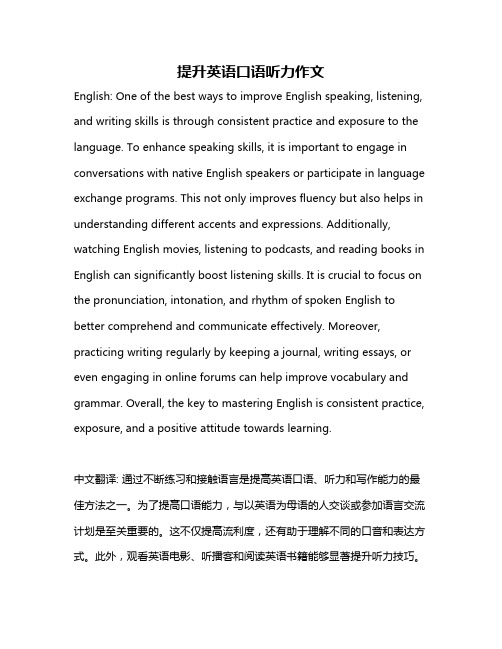
提升英语口语听力作文English: One of the best ways to improve English speaking, listening, and writing skills is through consistent practice and exposure to the language. To enhance speaking skills, it is important to engage in conversations with native English speakers or participate in language exchange programs. This not only improves fluency but also helps in understanding different accents and expressions. Additionally, watching English movies, listening to podcasts, and reading books in English can significantly boost listening skills. It is crucial to focus on the pronunciation, intonation, and rhythm of spoken English to better comprehend and communicate effectively. Moreover, practicing writing regularly by keeping a journal, writing essays, or even engaging in online forums can help improve vocabulary and grammar. Overall, the key to mastering English is consistent practice, exposure, and a positive attitude towards learning.中文翻译: 通过不断练习和接触语言是提高英语口语、听力和写作能力的最佳方法之一。
- 1、下载文档前请自行甄别文档内容的完整性,平台不提供额外的编辑、内容补充、找答案等附加服务。
- 2、"仅部分预览"的文档,不可在线预览部分如存在完整性等问题,可反馈申请退款(可完整预览的文档不适用该条件!)。
- 3、如文档侵犯您的权益,请联系客服反馈,我们会尽快为您处理(人工客服工作时间:9:00-18:30)。
如何提高英语听力能力
【摘要】本人根据多年教学经验认为要想提高英语听力能力必须持之以恒,广泛阅读,熟悉语境,加强听力、听速训练,同时在提升听力能力的各个阶段应做好相应工作,只有日积月累才能取得良好效果。
【关键词】英语
听力
朗读语境训练
人类的有声语言无论是东方的还是西方的,全都是耳听口讲的语言,所以学语言时,应当先从耳听人手。
在英语学习中,听事提高说、读、写技能的前提和基础。
可以说听的技能提高了,语言的交际就会成功的进行下去,其他技能也会随之得到提高。
初中新目标英语,进一步提高了对学生听力能力的要求:1、了解所听材料的大意;2、能够抓住材料中的具体细节;3、能够把自己所具备的背景知识与听力材料中所述的内容进行比较,以辨别其正误;4、能够判断说话人的意图和感知说话人对问题的态度。
要使学生达到上述英语听力的要求,掌握一定的听力理解技巧,
是非常重要,在训练学生英语听力的教学过程中,应当注意以下方面:
一、加强阅读和朗读,注意积累
阅读是英语学习中重要的积累过程,有了足够的积累,才能有丰
富的词汇及背景知识。
在阅读时,应有目的地选择新颖有趣、语言
地道、难度适中、题材广泛、循序渐进,实用性强,有利于培养学生学习英语的兴趣和积极性,扩大英语输入量。
朗读,即出声的阅读,这样有利于训练学生的语音、语调和语感,也同时促进听力的提高,优秀的英语学习者通常都有朗读的习惯,对学生而言,课本就是最好的材料,一些短小精练的英文简写本也是朗读的好材料,朗读和阅读一样,贵在持之以恒。
二、语境及听速训练
目前中国学生没有合适的英语语境,在语言反映速度上欠缺,导致对所听语言的理解造成障碍。
所以教师要努力营造英语听说、听写环境,在进行听力训练时常给予学生正常语速的语境训练,不一定要求学生完全听懂所给的语言材料,只要求学生跟上语言速度,理解语言环境。
另外教师应多鼓励学生收听收看英文广播,外国电影、电视等,这对于英语听力能力的提高有很大帮助。
三、课堂听力教学训练
以本为本,充分挖掘课本资源。
教师要充分利用每个单元的对话,课文及后面的听力材料,教师应将这些材料进行多样化的听力处理。
只有充分开发课本资源,才能在不知不觉中培养学生的听力能力。
在教学中借助英语磁带进行的课堂听力教学分为三个阶段:预备、训练、深化阶段。
预备阶段是很重要的,教师根据所听教材的难度,给学生适当的提示帮助,提示关键词、问带启发性的问题,还可给学生提供必要的语言环境,使之产生合乎逻辑的联想,激发其听的欲望。
另外,良好的听力练习对听力训练也大有帮在,可以有如下的设计:
1、单项练习
(1)听句子选择同意句
think
again and again before you decide to dosomething.
a:don’t take anything with you when you leave.
b:nobody believes what you said.
c:think it over before you decide to do it.
(2)填图练习。
设计一组容易混淆的图,给出听力材料,要求学生判断哪幅图与所听的内容一致或者判断顺序。
(3)口头懊速反映,例如:
how old are you ? i’m
ten..
what do you do ?
i’m
a
student.
2、综合分析练习
(1)情景反映,教师创设一定的情景然后给出一定的问题要求学生回答,如:
a:what’s this in english?
b:it’s a pen.
a:is that a pen?
b:no,it’s a pencil .
question:what’s that7
(2)短文填空,可分为填词或词组的练习。
(3)短文理解,给出一段短文要求学生根据所听内容进行选择或
回答问题。
训练阶段是听力训练的实质性阶段,通过听录音材料和缁理解性练习来完成,要求学生做到:1、自然轻松的心境和信心,且注意力高度集中;2、时间运用上应有超前意识,3、抓住主要事实确定重点;4、做好速记,把握细节。
5、学会取合。
深化阶段是听力训练的巩固阶段。
教师通过让学生进一步回答,讨论更深层次的问题,来使学生对听过的内容形成更系统更完整的概念,并适当地在“听”的基础上,把“听、说、读、写’四项技能结合起来,形成综合运用能力。
另外,很多听力材料,都是很好的诵读材料,在听之后,可以把材料给学生,作为平时的朗读材料。
总之,要练好听力,是一个坚持不懈的过程,只要长期坚持,师生
共同努力,就能取得良好的效果。
参考文献
[1]丁素平如何进行中学英语听力训练[j]
[2]林小营英语教学中的听力培养[j]
[3]汪琼瑛,浅谈英语教学中的听力培养[j]
[4]任淑凤,如何快乐学英语[j]
作者简介
罗朝盅(1957-),男(汉族),四川省会东县人,一级教师,四川省凉山州会东县民族中学任教,英语教学。
